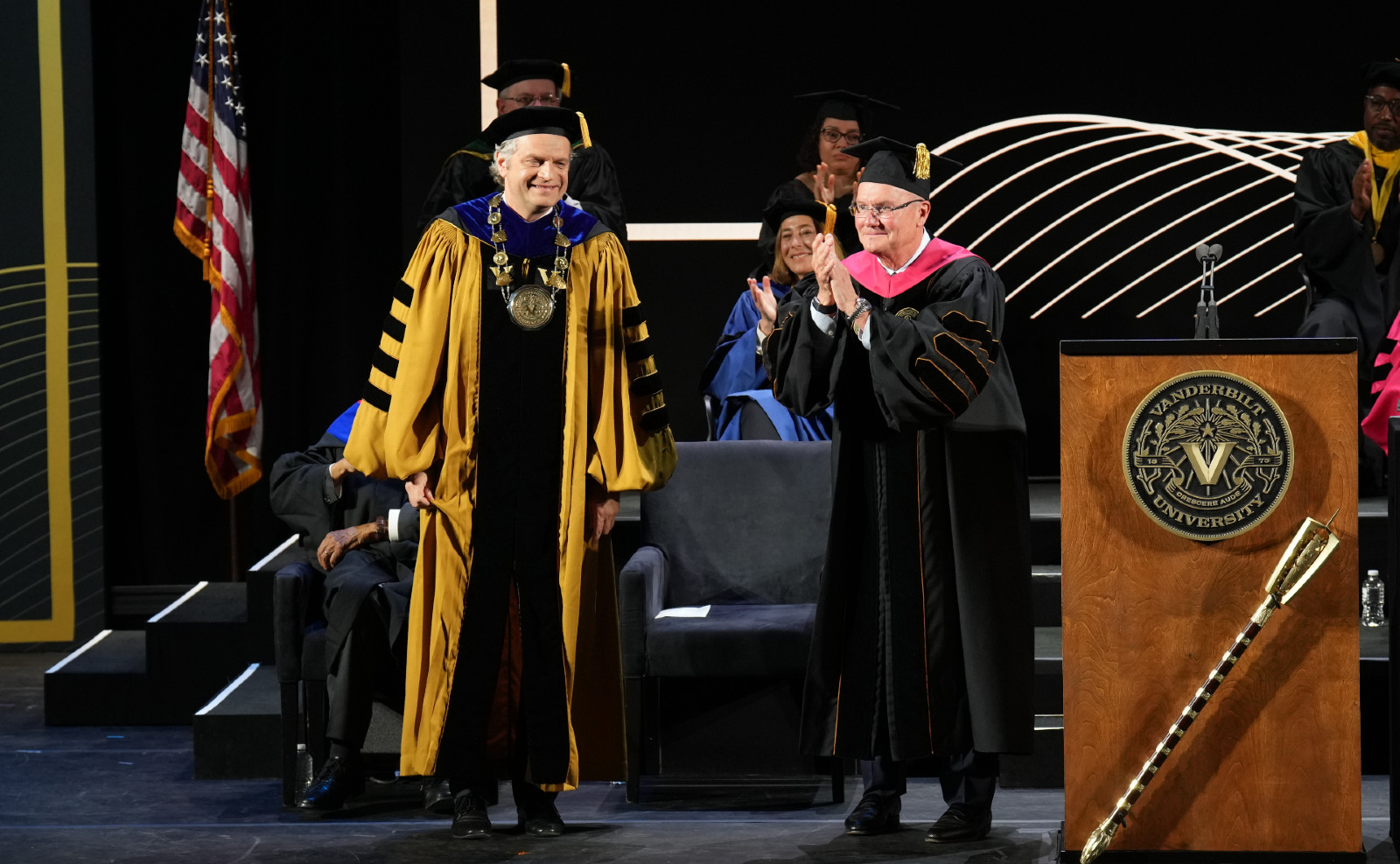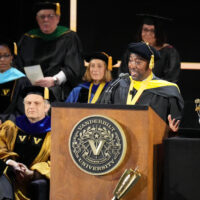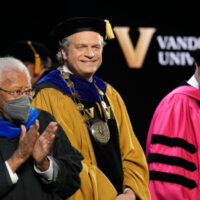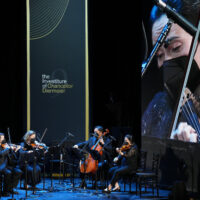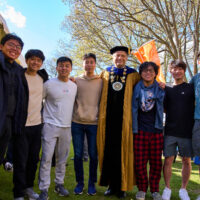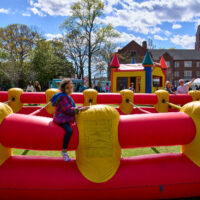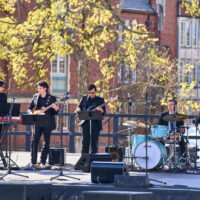In keynote remarks delivered at an investiture officially marking his tenure as Vanderbilt’s ninth chancellor, Daniel Diermeier urged the university community to seize this aspirational moment and join him in building “The Great University” for today’s world.
The Board of Trust hosted the formal event, one of the oldest traditions in academia, on April 9 at Langford Auditorium. Though Diermeier began leading Vanderbilt on July 1, 2020, the inaugural events were postponed to help protect the health and safety of the community during the height of the COVID-19 pandemic.
Dr. André Churchwell, vice chancellor for equity, diversity and inclusion and the university’s chief diversity officer, served as master of ceremonies for the celebration, which began with a procession by Vanderbilt’s own faculty and leaders of other universities wearing their full academic regalia. There was also a presentation of the symbols of office to the chancellor, remarks by distinguished alumni and university leaders, and the reading of a poem by Major Jackson, Gertrude Conaway Vanderbilt Professor of English, in honor of the occasion.
Watch the investiture ceremony.
Diermeier began his investiture address by recalling the unique moment of Vanderbilt’s founding, nearly 150 years ago, when Cornelius Vanderbilt and his wife, Frank Armstrong Vanderbilt, made what was then the largest charitable gift in American history to heal the wounds of a deeply divided nation after the Civil War.
“Today, on the cusp of our sesquicentennial, we are, by all measures, stronger than ever,” Diermeier said. “For this, we owe a debt of gratitude to the eight chancellors who came before me, all bringing their unique personalities and abilities to serve this great university. I am particularly grateful to my immediate predecessors, Interim Chancellor Susan Wente and Chancellor Nicholas S. Zeppos. Thanks in large part to their efforts, and the efforts of many people in this room, Vanderbilt was prepared to weather the storm of COVID and emerge even stronger.”
Diermeier cited several factors for Vanderbilt’s rising trajectory, including the enrollment of some of Vanderbilt most qualified and diverse students across all its schools and colleges; a thriving faculty of world-class scholars and innovators; and robust research and creative arts taking place throughout campus. Diermeier then called on the university community to reach even higher.
“Having outgrown our days of following the example of other institutions, and no longer looking over our shoulders to see what others think about us, we now have the opportunity to lead—to define The Great University for the 21st century,” Diermeier said. “As is so often the case, the path to greatness lies in knowing who we are. It lies in a clarity of purpose that guides us…and in the values that ground us. Purpose and values endure, but they need to be reimagined and newly understood in every age.”
Diermeier highlighted the three things a great university must do: protect and encourage civil discourse and intellectual diversity; maximize its capacity for research, discovery and innovation; and drive an inclusive prosperity in its neighboring communities and in the wider world.
He referenced the leadership of Vanderbilt’s fifth chancellor, Alexander Heard, in preserving the campus as a place where open discourse and free expression thrive.
“Amid the turbulence of the 1960s, when our campus hosted speakers as diverse and controversial as Allen Ginsberg, Stokely Carmichael and Strom Thurmond, Chancellor Heard explained the university’s commitment this way: ‘A university’s obligation is not to protect students from ideas, but rather to expose them to ideas, and to help make them capable of handling, and, hopefully, having ideas,’” Diermeier said.
He pointed to Vanderbilt’s pathbreaking research on vaccines as an example of the critical need for university research. “The reason America was ready to meet SARS-CoV-2 head-on, with rapidly developed vaccines, was because a close network of investigators at universities and research institutes—including our colleagues here at Vanderbilt and at the medical center—had conducted foundational research for many years before.”
Diermeier also spoke about Vanderbilt’s priority on strengthening ties between Vanderbilt and the Middle Tennessee region. “We can help the region evolve thoughtfully and intentionally, with growth rooted in the values and way of life that we all love,” he said. “What’s more, we can help ensure inclusive prosperity that touches everyone and leaves no one behind.”
In closing, Diermeier emphasized the importance of Vanderbilt leading by being authentically itself, rather than copying others. He described the importance of pursuing the university’s mission the “Vanderbilt Way,” with a signature sense of belonging, self-direction, continual growth and radical collaboration. He also expressed deep gratitude for being able to lead Vanderbilt at this pivotal time. “I have witnessed our culture of collaboration at work in ways large and small during the most challenging of times. I have come to know firsthand the character and resourcefulness of the people who make up our university community—your mettle and grit and bravery and creativity…your passion…and your dedication,” Diermeier said.
The program included performances by the Blair String Quartet and the Vanderbilt Chorale.
Following the main ceremony, hundreds of members of the Vanderbilt community and their families attended a festive celebration on Alumni Lawn that included free offerings from food trucks, live music, swag and a special play area for children.
As part of the series of events surrounding the investiture, Vanderbilt hosted in-person and hybrid panel discussions April 8 titled: The Commodore Way: Perspectives on Success in Vanderbilt Athletics and Now More than Ever: Higher Education’s Essential Role in an Age of Disruption. They were followed by a livestreamed symposium, Tennessee: Engine of Innovation.
Several Nashville buildings and structures were lit gold in honor of Diermeier’s investiture: the Korean Veterans Bridge on Thursday evening and the Tenessee State Capitol, Nashville International Airport parking garage and Grand Hyatt Nashville on both Friday and Saturday nights.
Reflections of alumni and university leaders speaking at Chancellor Diermeier’s investiture
Cybele Raver, provost and vice chancellor for academic affairs: “Chancellor Diermeier, I admire and appreciate how you are challenging all of us to reinvent and reinvigorate the concept of higher education as an engine of discovery and innovation and a provider of solutions. I am proud to be working alongside you as Vanderbilt realizes its ambitious vision while maintaining the humanity at its core. Your leadership emboldens us to recruit the nation’s absolute best scholars for our professorate. At the same time, you help us better make the connections between discovery and the economic growth that comes with applied innovation, supporting Tennessee entrepreneurs and start-ups through initiatives like The Wond’ry.”
Lamar Alexander, BA’62, former U.S. senator and Tennessee governor: “Vanderbilt prizes the diversity of its students. The university has honored alumnus James M. Lawson, a civil rights pioneer who shares the stage with us today, by creating an institute that symbolizes the progress made in the 60 years since I graduated from Vanderbilt. Then, the undergraduate school was segregated by race—until protesting students in that year convinced the Board of Trust to change its policy. But more than most universities, Vanderbilt has sought to turn its diversity into unity. Chancellor Diermeier’s Unity and American Democracy Project seeks to create a campus culture in which students and faculty and visitors of many different backgrounds and views can live together, speak civilly to one another and find a common purpose. This is not incidental stuff.”
Bruce Evans, BE’81, chairman of the Board of Trust: “Since Daniel’s arrival, in what must be an all-time pre-investiture record of accomplishment, the university has weathered the pandemic and returned to normalcy; maintained and built financial strength in support of our mission; invigorated the university’s fundraising—exceeding its annual objectives and initiating significant new capital fundraising initiatives; launched Destination Vanderbilt to recruit more world-class faculty to our campus; appointed our groundbreaking alumna Candice Lee as our athletic director and launched Vandy United to upgrade our athletic facilities and support the success of Vanderbilt student athletes; refined and accelerated our undergraduate residential college building project, including the soon-to-be open Rothschild College; improved the academic buildings of several of our graduate schools and launched construction of our Graduate Student Village. As we approach our 150th anniversary in 2023, each passing day affirms that Daniel was the right leader for Vanderbilt during the darkest days of the pandemic, that he is the right leader for Vanderbilt today and will be the right leader for Vanderbilt tomorrow.”
The Rev. James Lawson, Vanderbilt Distinguished Alumnus and former distinguished university professor: “On a personal note, Dorothy and Jim Lawson never broke with Nashville or Vanderbilt University. We had two good years here. We would never deny the quality of life and the quality of learning that I had at Vanderbilt, so we never broke—in large measure because of the nonviolent philosophy that we human beings do not have to hate each other in order to work together, to create light abundant for ourselves, our children, our families, our communities, our neighbors.”
Candice S. Lee, BS’00, Med’02, EdD’12, vice chancellor for athletics and university affairs and athletic director: “In my world, elite athletes must believe they are the best or they risk getting beat before they even begin. But I also know that those same athletes must be coachable and curious about how to improve in order to truly succeed. Chancellor Diermeier strikes this balance well. He dares himself to grow as he embodies his role. As the leader of the institution, he empowers others to do the same. He has hit the ground running and has not slowed down since. In fact, he made the comment the other day that as a university we are traveling at 100 miles per hour in the right direction. But then he followed that up with saying, ‘and we are in a 100 mile per hour speed zone.’ There is an orientation toward action — let’s get things done—but do so with the discipline, diligence, intellect and care that this community deserves.”
Sarah Igo, Andrew Jackson Professor of History and dean of strategic initiatives, College of Arts and Science: “I first met Daniel Diermeier in 2019 during a formal, suited interview in Chicago—where he impressed us with his polymath intellect, his prodigious knowledge and acuity as he talked about where universities had been and the possible shape of their future. I first encountered him here, at Vanderbilt, in very different circumstances: in sandals, strolling through our eerily quiet campus in the early summer of 2020. I was walking my dog, I believe, and I apologized on behalf of the search committee. Little could we have imagined the burdens he would face as Vanderbilt’s incoming chancellor. Yet, he was beaming and clearly undaunted, even energized: thrilled, he said, about the opportunities that lay ahead. Even as we celebrate, we must acknowledge the urgency of our moment: rising public skepticism about the value of science, scholarship, and the university itself; challenges to the possibility of trustworthy knowledge; political clashes over the boundaries of speech on campus; steep barriers in making open to all the transformative power of an elite education. We are fortunate in these times to have found our own ‘lucky number’—perhaps even our ‘positive perfect power’: a leader unfazed by the unknown, and eager to shape higher education’s future.
Visit the Investiture website to read Chancellor Diermeier’s remarks and all of the speakers’ remarks from the event.
